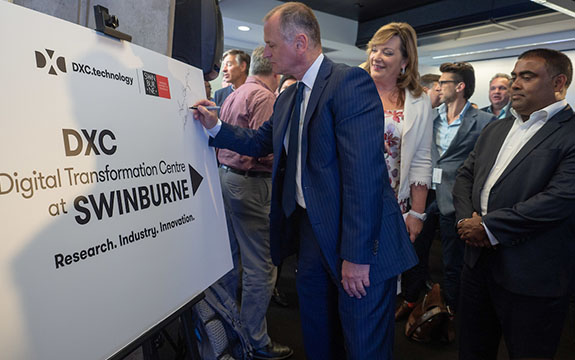DXC Technology and Swinburne open DXC Digital Transformation Centre at Swinburne

In Summary
- The new DXC Digital Transformation Centre at Swinburne will allow for collaborative research between government, Australian industries and academia
- Guide Dogs Victoria is the first client of DXC Digital Transformation Centre at Swinburne
DXC Technology, the world’s leading independent, end-to-end IT services company, and Swinburne University of Technology, an industry aligned university with key strengths in Industry 4.0 and advanced digital research and innovation, today announced the opening of the DXC Digital Transformation Centre at Swinburne (DTC).
Based at Swinburne’s Hawthorn campus, the DXC Digital Transformation Centre at Swinburne is the first of its kind in Australia and will allow for collaborative research between government, Australian industries and academia. The DTC will also facilitate the creation of a new talent pool of students to support the evolving needs of workforces and communities as they prepare for a digital future.
In conjunction with the opening of the DXC Digital Transformation Centre at Swinburne, DXC and Swinburne announced the DTC’s first client, Guide Dogs Victoria.
The DXC Digital Transformation Centre at Swinburne will showcase a new and evolving approach for clients to deliver digital solutions by drawing on DXC’s global experience in digital transformation and Swinburne’s expertise in Industry 4.0 technology, social impact and design thinking. It will engage research excellence across all key digital research capabilities including artificial intelligence and machine learning, blockchain, Internet of Things, cybersecurity, advanced visualisation, autonomous systems and cloud computing.
“By creating a space for the incubation of ideas and learning, we believe the DXC Digital Transformation Centre at Swinburne will spark new conversations which lead to innovative solutions that solve real business challenges faced by Australian enterprises,” says Seelan Nayagam, managing director, DXC Technology, Australia and New Zealand.
“The DXC Digital Transformation Centre at Swinburne will provide an environment focused on generating rapid outcomes and return on investment for organisations embarking on digital tranformation, and new product and service development.”
“This partnership with DXC Technology further builds our ecosystem of key global digital business partnerships embedded on campus that are aligned with our key research strengths,” says Swinburne’s Deputy Vice Chancellor of Research and Development, Professor Aleksandar Subic.
“Having DXC Technology right here on campus through this collaborative venture puts Swinburne at the forefront of digital transformation and will drive new research-led innovations and solutions for the rapidly changing industry environment.”
Guide Dogs Victoria has been quick to recognise the benefits of engaging the DXC Digital Transformation Centre at Swinburne to develop a working prototype of a Peer Support Platform for individuals with low vision or blindness.
“Improving client outcomes is always the focus for our organisation and being at the forefront of technological innovation is an important ingredient to achieve this. This collaboration will allow us to work with the brightest minds at both DXC and Swinburne on what will be the first project under their new partnership,” says Guide Dogs Victoria CEO, Karen Hayes.
“After securing an NDIS-funded grant earlier in the year to address information access and social isolation issues for our clients, we’re excited to bring together DXC, Swinburne researchers and our clients to create a new Peer Support Platform that will enable Victorians with low vision and blindness to actively contribute to leading, shaping and influencing their community.”
This unique offering of the DXC Digital Transformation Centre at Swinburne draws on collaborative minds and home-grown partnerships across industry, academia, community and government, and is intended to foster a new culture of innovation in a digital world.
“In October 2017, DXC announced its plans to open Digital Transformation Centres in Australia, with the aim of advancing digital innovation and delivering economic and social impact outcomes. We are delighted to see this vision come to life at Swinburne today,” added Mr Nayagam.

